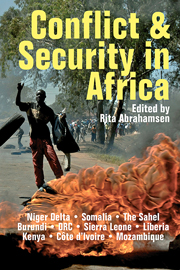Book contents
- Frontmatter
- Contents
- Preface
- Notes on Contributors
- Permissions
- 1 Introduction: Conflict & Security in Africa
- Section One Global Economies, State Collapse & Conflicts
- 2 Ironies of Post-Cold War Structural Adjustment in Sierra Leone
- 3 Timber Booms, State Busts: The Political Economy of Liberian Timber
- 4 Petro-Insurgency or Criminal Syndicate? Conflict & Violence in the Niger Delta
- 5 Oil as the ‘Curse’ of Conflict in Africa: Peering through the Smoke & Mirrors
- 6 Defence Expenditures, Arms Procurement & Corruption in Sub-Saharan Africa
- Section Two Global Security Governance
- Section Three Cultures of Conflict & Insecurity
- Index
5 - Oil as the ‘Curse’ of Conflict in Africa: Peering through the Smoke & Mirrors
from Section One - Global Economies, State Collapse & Conflicts
Published online by Cambridge University Press: 05 October 2013
- Frontmatter
- Contents
- Preface
- Notes on Contributors
- Permissions
- 1 Introduction: Conflict & Security in Africa
- Section One Global Economies, State Collapse & Conflicts
- 2 Ironies of Post-Cold War Structural Adjustment in Sierra Leone
- 3 Timber Booms, State Busts: The Political Economy of Liberian Timber
- 4 Petro-Insurgency or Criminal Syndicate? Conflict & Violence in the Niger Delta
- 5 Oil as the ‘Curse’ of Conflict in Africa: Peering through the Smoke & Mirrors
- 6 Defence Expenditures, Arms Procurement & Corruption in Sub-Saharan Africa
- Section Two Global Security Governance
- Section Three Cultures of Conflict & Insecurity
- Index
Summary
This article is structured around three broad questions: is oil endowment really a ‘curse’ to Africa? To what extent can studies based on a statistical correlation between oil abundance and the onset, duration and intensity of armed conflict (Ross 2003; Collier and Hoeffler 2004; Lujala 2009; 2010) adequately capture the complex roots, forces and local and transnational ramifications of armed conflict in oil-rich African states? How is the resource curse constructed and reproduced and whose interests does it serve? These questions are impelled by the trend in some scholarly, policy and media circles which identifies oil endowment as a major factor of conflict, institutional weakness and corruption on the continent. In this essay, although ‘oil’ and ‘resource’ are used interchangeably, the emphasis is on oil as Africa's most strategic and sought after commodity in global markets.
The ‘oil curse’ perspective defines oil largely in terms of a central role in increasing the risk of violent conflict, poor economic growth, or acting as a disincentive for peace (Basedau and Lay 2009:758). At its core lies the notion of resource/oil abundance as underpinning the financial motives/opportunities for rebels to engage in armed conflict, or as a causal factor in (rentier) state weakness either through the propensity for corruption, misrule, authoritarianism or instability (Elbadawi and Sambanis 2000; Herbst 2000; Sachs and Warner 2001; Ross 2003; Auty 2004; Collier and Hoeffler 2004; Fearon 2005: 483–507; Rosser 2006; Le Billon 2007: 163-182; Collier 2007; Ross 2008; Lujala 2010).
- Type
- Chapter
- Information
- Conflict and Security in Africa , pp. 65 - 78Publisher: Boydell & BrewerPrint publication year: 2013



